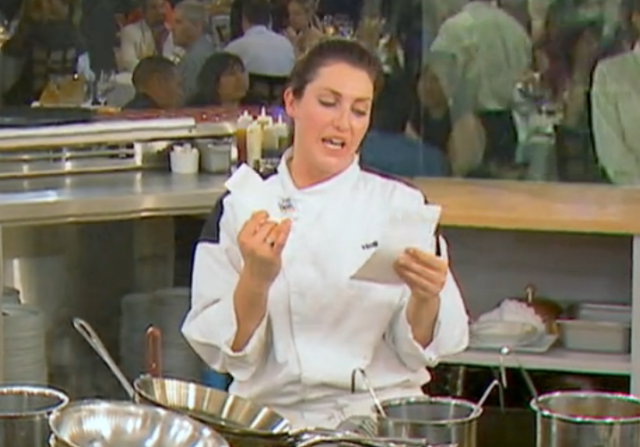Dear Dad,
I just finished watching Hell’s Kitchen season 7. If you know anything about the show, you’ll realize it’s in season 13 now, but it’s free on Hulu, so whatever. I’ve been sort of lazily watching episodes when I get off stressful days at work so I can relax by watching other people stress.
The show format is simple: Bunch of cooks all compete for an executive chef job while Gordon Ramsay cusses at them. This season had a first, though, as a romance developed between two competitors, Holli and Jay. At one point in the confessional, Jay says, “I have two goals in Hell’s Kitchen, and one is to sleep with Holli.” The other is to win.
The romance isn’t all that surprising. I was honestly more surprised that there hadn’t been much flirtation in previous seasons. It’s reality TV!
What was odd, for me, was watching two of the male competitors, Jay and Ben, discussing their rivals, and each other. Jay frankly tells Ben that he likes Holli, but he doesn’t believe she’s competition. Over the course of several episodes, the two men size each other up as rivals, and Holli, and another woman, Autumn, are written off as “not passionate” or skilled enough, despite Holli’s frequent challenge wins and praise from Chef Ramsay.
“I’m a better cook than Holli and Autumn, I know it. And I’m the only person that can compete with Jay,” Ben says in a confessional.
After Holli wins a challenge, Ben and Jay tear down the women in private.
“If I lost to Holli, I’d be really angry, but if I lost to Autumn, I would be suicidal,” Jay says. Then, the kicker: “I know I can beat Holli, but I don’t know if I want to just beat Holli. I think I want to go out, like I want to lose to someone good.”
“Even if I don’t win, and she wins, I’ll still be further than her in three years,” Ben says.
“Oh, of course, dude,” Jay agrees.
It’s obvious that the men here see themselves as serious competitors, real chefs, with enormous egos to match. The women are just cooks who would rather be partying or getting dolled up, they say, as if beauty and brains can’t exist in the same person.
After watching the finale, I told my boyfriend about the way the men wrote Holli off.
“It was so odd,” I said.
“Oh, it’s not odd,” he told me.
I thought about it for a minute. What was odd about the show was not the ideas, really, so much as hearing them aloud. It’s the kind of thing, as a woman or marginalized group, that you always suspect is happening but can’t necessarily prove. I worked with a man once who talked to all the men like colleagues, but seemed to talk to the women like his inferiors, even though I had been at the business far longer than he had. But there was no way, aside from impressions, that I could prove he looked down on me as a woman.
And that’s the thing about sexism, Dad. It’s subtle, it’s insidious, it’s little suspicions and impressions. And often, I think, the person perpetuating these prejudices doesn’t even realize they are. So many misogynists insist that they “love women,” that they appreciate our bodies or our delicate touch. Jay would probably say that he likes Holli, he does say she’s “good looking,” but it’s clear from his attitude toward her that he doesn’t respect her. He just thinks she’s attractive.
It might be the most important, real thing I’ve ever seen on reality TV.
Love and respect,
Victoria
